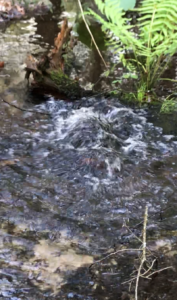
One of the burbling leaks off Deerhaven Road shot about a month ago. Click here or on image to see a short video of the same leak shot earlier this week during a dry spell.
Editor’s note: This article has been superseded by updated information — see “Water Dept. clarifies: Outdoor watering is OK two days a week” (May 23, 3013).
As of May 1, Lincoln homeowners are allowed to do outdoor watering on only one day a week — mainly because the town does not comply with water usage guidelines due to ongoing leaks, among other reasons.
The Mass. Department of Environmental Protection adjusts summer watering rules every year depending on the drought condition, which is currently Stage 0 (no drought). Normally this would correspond with Stage 1 for Lincoln (no restrictions on watering), but the town is required to set its watering limit one level higher than the state’s because of its noncompliance — thus, Stage 2.
Last year, Stage 2 meant watering was restricted to two days a week, but MassDEP just released new rules reducing that to one day a week before 9 a.m. and after 5 p.m., although watering ornamentals and flower gardens with drip irrigation, hand-held house or watering cans is permitted any time. The change is so new that the state and town websites have not yet been updated with the latest information, according to Water Department Superintendent Darin LaFalam.
In recent years, Lincoln has been in violation at various times of three state water usage guidelines by exceeding:
- the 0.53 mgd (million gallons per day) average withdrawal from the Charles River watershed allowed by its Water Management Act permit
- the 65 gallon-a-day per capita target
- the state goal of having less than 10% of water unaccounted for as a result of leaks in town mains and on private property between mains and individual homes
The three problems are tied together and are caused not just by residents using too much water in their homes and gardens, but because of water loss due to non-metered use and leaks — many of which have been going on for years. Some are hard to find because they’re underground and special equipment is needed to locate them.
“We’ve been working hard to reduce our unaccounted-for water,” LaFalam said. “We have gone to leak detection surveys twice a year, compared to the industry standard of once every two years. Our unaccounted-for water dropped from 26% in 2021 to a preliminary 5% in 2022,” though MassDEP is still reviewing that report, he added.
In 2022, Lincoln’s water use met the 0.53 mgd limit, though the average residential gallons per capita per day (RGPCD) was 73 mgd, compared to the DEP goal of 65 mgd, LaFalam said. “We did find some large leaks in 2022 and expect this number to be lower in the future, particularly with town residents’ cooperation with water conservation. The better we do on the unaccounted-for water, the lower the average daily water use will be and the lower the RGPCD will be.
“I think the leaks repaired last year go a long way towards reaching the three guidelines listed,” he added. “Continued vigilance with leak detection is also necessary. We recently fixed a ‘small’ leak on Brooks Hill Road that we estimate had leaked over 1 million gallons of water so far this year. We are also trying to get homeowners to repair leaking service lines as quickly as possible.”
The town’s water mains are very old and frequently spring new leaks. Some of the more dramatic leaks — though they don’t contribute to the unaccounted-for water — are in several places along a century-old disused clay pipe that once carried water from Flint’s Pond to Concord.
After a rainstorm, the leak creates an eight-inch-high “geyser” that’s loud enough to hear from the road about 100 feet away, but burbles above ground constantly even in dry weather, according to one resident who lives near the pipe south of Deerhaven Road close to Mill Brook. The resident said there are multiple leaks in the area that provide enough water for kids to play in during the summer, and that they’ve been going on for years.
Though the old pipe’s contents are not counted as part of Lincoln’s water usage, “it is water we’re losing from Flint’s Pond and we’re eager to get it fixed,” said LaFalam, adding that the Water Department hopes to get it fixed this spring or summer.
Asked whether the state might loosen its requirements over time as the population grows, he noted it was quite the opposite. “MassDEP will not get more relaxed when it comes to conservation. They are getting more and more strict, as evidenced by the Stage 1 water conservation level being reduced from two days outdoor watering per week to one day,” he said.
Two very large leaks were spotted by alert Lincoln residents last year, during the drought, hearing water running in a storm drain and seeing water bubbling out of the ground for no reason. These two leak repairs probably made a big difference on the UAW and show how residents can help by reporting suspected leaks.
Ruth Ann,
On various occasions, when there is no recent or current rain, I have noted water flow in the catch basin at the foot of Library Lane.
Could this be evidence of a leak?
Robert DeNormandie